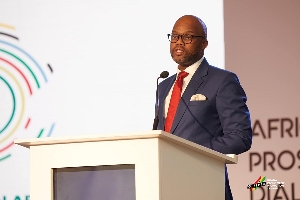 Secretary-General of the African Continental Free Trade Area, Wamkele Mene
Secretary-General of the African Continental Free Trade Area, Wamkele Mene
Wamkele Mene, Secretary-General of the African Continental Free-Trade Area (AfCFTA) Secretariat, emphasized that digital technology and inclusive value chains are crucial for integrating Africa’s economies into a single dynamic market.
He made these remarks at a regional workshop in support of AfCFTA implementation held in Accra.
The workshop featured key events and discussions on obstacles such as non-tariff barriers and technical barriers to trade across the African continent.
In a speech read on his behalf, Mene highlighted that Africa’s young population is increasingly connected through rapidly growing digital and mobile access.
He noted that the burgeoning digital economy creates enormous opportunities in the e-commerce marketplace, where women- and youth-led cross-border businesses could tap into a consumer market projected to reach $2.5 trillion by 2030.
The workshop also addressed these challenges by providing MSMEs with practical insights and solutions to navigate the trade environment more effectively.
Mene stated that investment in digital infrastructure and technology could significantly accelerate the objectives of the AfCFTA, fostering self-employment opportunities for Africa’s youth and boosting intra-African trade.
He explained that the AfCFTA protocol on digital trade establishes the regulatory environment and legal framework necessary to further harness trade across the continent.
“It complements other AfCFTA protocols, such as those on investments, intellectual property, and competition policy, ensuring a cohesive approach to trade facilitation. Together, these protocols enable the development of a digital single market as envisioned by the AU Digital Transformation Strategy for Africa. By 2030, this unified digital space will bolster the physical free trade area, enhancing trade efficiency and inclusivity,” he said.
Mene also noted that protocols on digital trade lay the groundwork for articulating a common African position in negotiating favorable outcomes with global trade partners, ensuring that the continent’s economic interests are protected and advanced.
Naa Densua Aryeetey, President of Ghana’s Gender Subcommittee, Women in Cross-Border Trade, highlighted that access to finance, security, and safety are major limitations to intra-continental trade.
She called for a conducive business regulatory environment to enable women to play their role in the AfCFTA.
Aryeetey mentioned that although the Trade Facilitation Agreement under the AfCFTA framework is gender-neutral, there are measures that benefit women, but they are not widely known.
She emphasized the importance of trade facilitation measures, such as consulting with traders and giving them the opportunity to comment on trade-related regulations.
Mamadou Biteye, Executive Secretary of the African Capacity Building Foundation (ACBF), stated that bridging the intra-African market would foster economic growth and create opportunities within the continent.
He urged trade ministries across Africa to implement the necessary policies to complement efforts by the AfCFTA secretariat to enhance capacity for trade facilitation and create an ecosystem where innovation can thrive.
Biteye noted that the AfCFTA is not only a trade facilitation program but also a platform for transformative change on the African continent.
Watch the latest edition of BizTech below:
Click here to follow the GhanaWeb Business WhatsApp channel